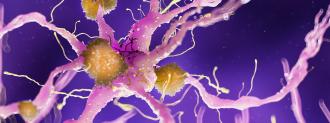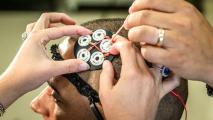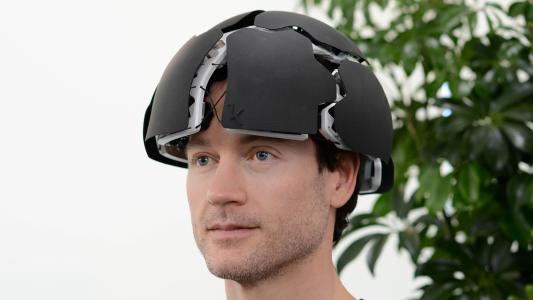Fresh on the heels of a new FDA drug approval for Alzheimer’s, fraught with both hope and controversy, researchers at the University of Cincinnati and Sweden’s Karolinska Institute have proposed an alternative to the dominant theory of what causes Alzheimer’s disease.
The new drug, aducanumab, was the first approved Alzheimer’s treatment in nearly two decades, and it is supposed to work by clearing clumps of a protein called amyloid-beta — Alzheimer’s calling card. The drug did not clearly improve patients’ cognitive decline, but it did reduce those amyloid plaques.
The theory behind the FDA’s approval — and vast swaths of Alzheimer’s research — is that those amyloid plaques are behind the disease. Alter them, alter the disease — theoretically.
Alberto Espay disagrees.
“It’s not the plaques that are causing impaired cognition, ” Espay, a professor of neuroscience at UC, said in a release. “Amyloid plaques are a consequence, not a cause” of Alzheimer’s disease.
The amyloid plaque problem: “The amyloid cascade hypothesis has been the prevailing paradigm for understanding Alzheimer’s disease (AD) pathogenesis,” the authors wrote in their study, published in The Lancet’s EClinicalMedicine.
That hypothesis goes as follows: The plaque buildup disrupts communication between brain cells and marshalls the immune system. The immune system causes inflammation, and eventually brain cells begin to die.
“It’s not the plaques that are causing impaired cognition. Amyloid plaques are a consequence, not a cause.”
Alberto Espay
Here’s the thing about the amyloid plaque theory, however: drugs that can clear the plaques — like aducanumab — have thus far had no impact on the disease itself.
Further complicating the picture? The presence of amyloid plaques “does not invariably predict dementia,” as the authors note in their study. According to the researchers, by the age of 85, around 60% of people will have amyloid plaques in the brain; only 10% will develop dementia.
Staying in shape: Espay et al. are still focused on the amyloid protein — but they think the answer lies in the amyloid protein that’s in its non-clumped, water-soluble form.
When it isn’t aggregated into plaques, the amyloid protein maintains its unique structure and goes about its business in the brain. Once they glom together, the researchers say, the proteins lose their proper shape and, with it, their functional abilities.
The researchers theorized that it is actually the loss of these soluble amyloid proteins in the brain that may be the cause of Alzheimer’s disease, and its associated cognitive decline — not the amyloid plaques per se, which may be more gravestone than murder weapon.
Looking for good amyloid: To see if they might be right, researchers analyzed the brain scans and spinal fluid from 598 patients with plaques enrolled in the Alzheimer’s Disease Neuroimaging Initiative.
They found that people with higher levels of soluble amyloid protein were cognitively normal — regardless of how much plaque was present. The free-floating protein was also associated with larger hippocampuses, the region of the brain tied to memory.
People with higher levels of soluble amyloid protein were cognitively normal — regardless of how much plaque was present.
“The key discovery from our analysis is that Alzheimer’s disease symptoms seem dependent on the depletion of the normal protein, which is in a soluble state, instead of when it aggregates into plaques,” Kariem Ezzat, a researcher at the Karolinska Institute and study co-author, said.
The team is now continuing to test their hypothesis in animal models.
If the work continues to bear out, it could cause a paradigm shift in treating Alzheimer’s disease, one which moves away from eliminating plaques and instead seeks to replenish amyloid, in its non-clumped-together form.
We’d love to hear from you! If you have a comment about this article or if you have a tip for a future Freethink story, please email us at tips@freethink.com.






